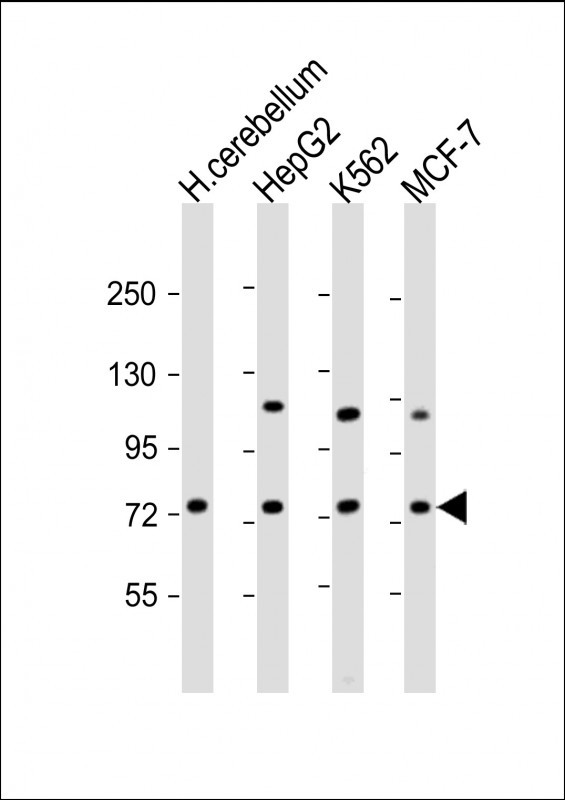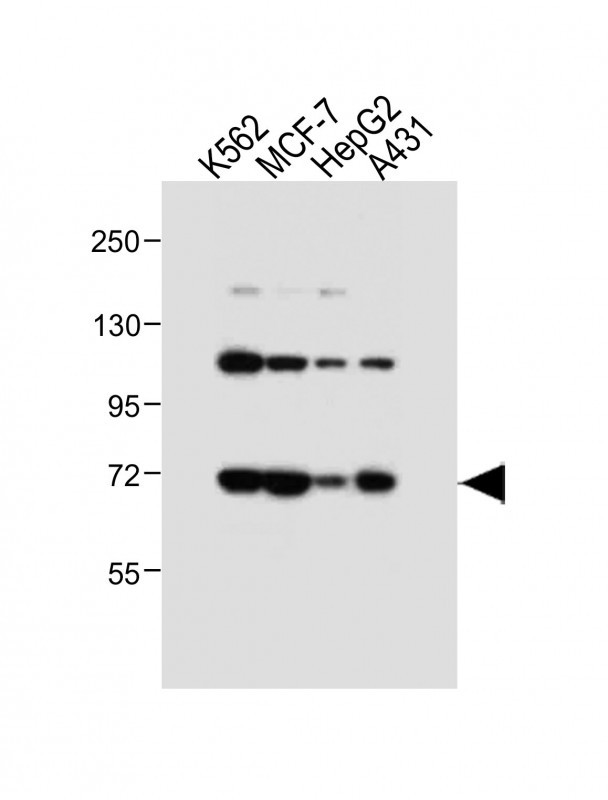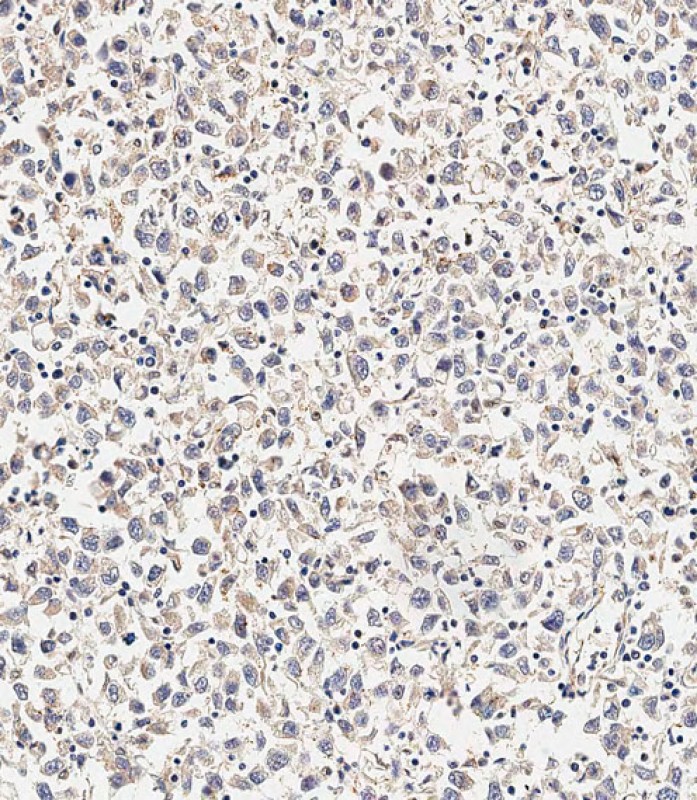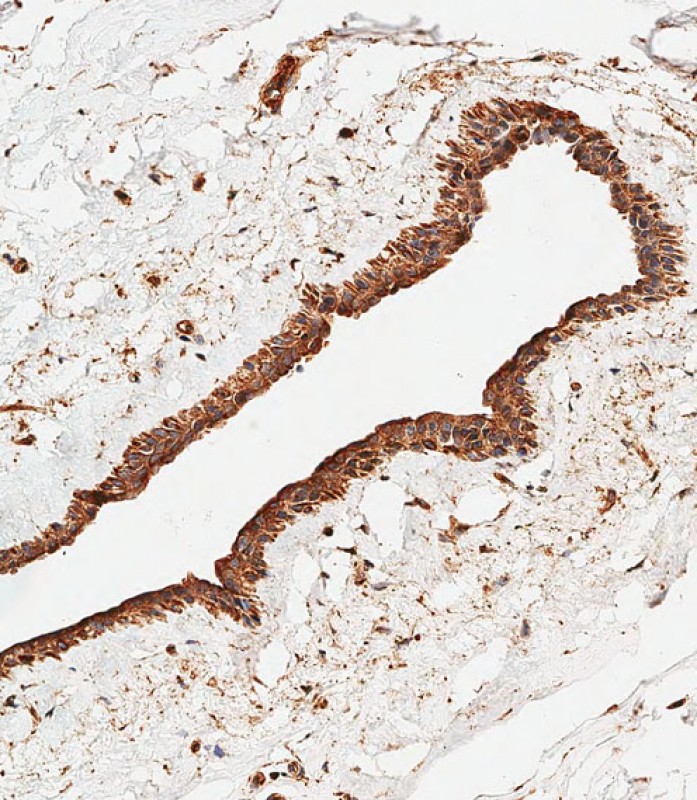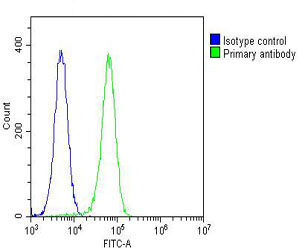SMPD1 Antibody (C-term)
Affinity Purified Rabbit Polyclonal Antibody (Pab)
- SPECIFICATION
- CITATIONS: 1
- PROTOCOLS
- BACKGROUND

Application
| IHC-P-Leica, WB, FC, E |
|---|---|
| Primary Accession | P17405 |
| Other Accession | Q0VD19, NP_000534.3 |
| Reactivity | Human |
| Predicted | Bovine |
| Host | Rabbit |
| Clonality | Polyclonal |
| Isotype | Rabbit IgG |
| Calculated MW | 69936 Da |
| Antigen Region | 391-419 aa |
| Gene ID | 6609 |
|---|---|
| Other Names | Sphingomyelin phosphodiesterase, Acid sphingomyelinase, aSMase, SMPD1, ASM |
| Target/Specificity | This SMPD1 antibody is generated from rabbits immunized with a KLH conjugated synthetic peptide between 391-419 amino acids from the C-terminal region of human SMPD1. |
| Dilution | IHC-P-Leica~~1:500 WB~~1:4000 FC~~1:25 E~~Use at an assay dependent concentration. |
| Format | Purified polyclonal antibody supplied in PBS with 0.09% (W/V) sodium azide. This antibody is purified through a protein A column, followed by peptide affinity purification. |
| Storage | Maintain refrigerated at 2-8°C for up to 2 weeks. For long term storage store at -20°C in small aliquots to prevent freeze-thaw cycles. |
| Precautions | SMPD1 Antibody (C-term) is for research use only and not for use in diagnostic or therapeutic procedures. |
| Name | SMPD1 (HGNC:11120) |
|---|---|
| Function | Converts sphingomyelin to ceramide (PubMed:12563314, PubMed:1840600, PubMed:18815062, PubMed:25339683, PubMed:25920558, PubMed:27659707, PubMed:33163980). Exists as two enzymatic forms that arise from alternative trafficking of a single protein precursor, one that is targeted to the endolysosomal compartment, whereas the other is released extracellularly (PubMed:20807762, PubMed:21098024, PubMed:9660788). However, in response to various forms of stress, lysosomal exocytosis may represent a major source of the secretory form (PubMed:12563314, PubMed:20530211, PubMed:20807762, PubMed:22573858, PubMed:9393854). |
| Cellular Location | Lysosome. Lipid droplet. Secreted. Note=The secreted form is induced in a time- and dose-dependent by IL1B and TNF as well as stress and viral infection. This increase of the secreted form seems to be due to exocytosis of the lysosomal form and is Ca(2+)-dependent (PubMed:20530211, PubMed:20807762, PubMed:22573858). Secretion is dependent of phosphorylation at Ser-510 (PubMed:17303575). Secretion is induced by inflammatory mediators such as IL1B, IFNG or TNF as well as infection with bacteria and viruses (PubMed:12563314, PubMed:20807762) |

Provided below are standard protocols that you may find useful for product applications.
Background
The protein encoded by this gene is a lysosomal acid sphingomyelinase that converts sphingomyelin to ceramide. The encoded protein also has phospholipase C activity. Defects in this gene are a cause of Niemann-Pick disease type A (NPA) and Niemann-Pick disease type B (NPB). Multiple transcript variants encoding different isoforms have been identified. [provided by RefSeq].
References
Bailey, S.D., et al. Diabetes Care 33(10):2250-2253(2010) Desnick, J.P., et al. Mol. Med. 16 (7-8), 316-321 (2010) : Talmud, P.J., et al. Am. J. Hum. Genet. 85(5):628-642(2009) Sugiyama, N., et al. Mol. Cell Proteomics 6(6):1103-1109(2007) Sleat, D.E., et al. Mol. Cell Proteomics 5(4):686-701(2006)
If you have used an Abcepta product and would like to share how it has performed, please click on the "Submit Review" button and provide the requested information. Our staff will examine and post your review and contact you if needed.
If you have any additional inquiries please email technical services at tech@abcepta.com.














 Foundational characteristics of cancer include proliferation, angiogenesis, migration, evasion of apoptosis, and cellular immortality. Find key markers for these cellular processes and antibodies to detect them.
Foundational characteristics of cancer include proliferation, angiogenesis, migration, evasion of apoptosis, and cellular immortality. Find key markers for these cellular processes and antibodies to detect them. The SUMOplot™ Analysis Program predicts and scores sumoylation sites in your protein. SUMOylation is a post-translational modification involved in various cellular processes, such as nuclear-cytosolic transport, transcriptional regulation, apoptosis, protein stability, response to stress, and progression through the cell cycle.
The SUMOplot™ Analysis Program predicts and scores sumoylation sites in your protein. SUMOylation is a post-translational modification involved in various cellular processes, such as nuclear-cytosolic transport, transcriptional regulation, apoptosis, protein stability, response to stress, and progression through the cell cycle. The Autophagy Receptor Motif Plotter predicts and scores autophagy receptor binding sites in your protein. Identifying proteins connected to this pathway is critical to understanding the role of autophagy in physiological as well as pathological processes such as development, differentiation, neurodegenerative diseases, stress, infection, and cancer.
The Autophagy Receptor Motif Plotter predicts and scores autophagy receptor binding sites in your protein. Identifying proteins connected to this pathway is critical to understanding the role of autophagy in physiological as well as pathological processes such as development, differentiation, neurodegenerative diseases, stress, infection, and cancer.
